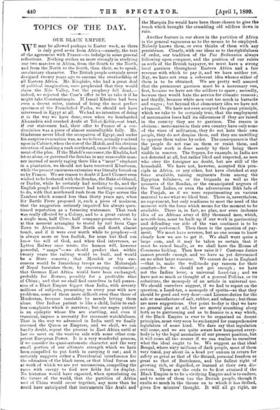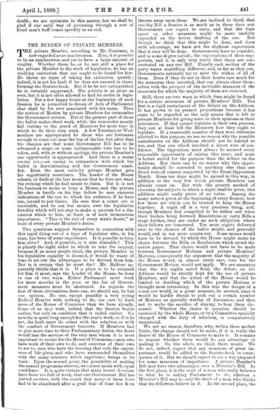TOPICS OF THE DAY.
OUR BLACK EMPIRE.
WE may be allowed perhaps in Easter week, as there is only good news from Africa—namely, the text of the agreement with France—to indulge in some general reflections. Nothing strikes us more strongly in studying our two marches in Africa, from the South to the North, and from the North to the South, than their, so to speak, involuntary character. The British people certainly never designed twenty years ago to assume the overlordship of all Eastern Africa. Mr. Kinglake, who had a great deal of political imagination, once prophesied that they would claim the Nile Valley, but the prophecy fell dead,— indeed, we rejected the Czar's offer to let us take it if he might take Constantinople. If Ismail Khedive had been even a decent ruler, instead of being the most perfect specimen of the Frenchified Pasha, we should not have intervened in Egypt at all. We had no intention of doing it in the way we have done, even when we bombarded Alexandria and crushed Arabi at Tel-el-Kebir,—at least, if our statesmen had, their offer to France of a con- dominium was a piece of almost unintelligible folly. Mr. Gladstone never liked the occupation of Egypt, and under his auspices evacuation was, as we believe, actually resolved upon in Cabinet, when the rise of the Mandi, and his obvious intention of making a rush northward, caused the abandon- ment of the plan. If the Mandi's successor, the Khalifa, bad let us alone, or governed the Soudan in any reasonable man- ner instead of merely raging there like a "must" elephant in a plantation, we should not have recovered Khartoum, while the present enormous extension was literally forced on us by France. We see reason to doubt if Lord Cromer even wished to be bothered with the Soudan, the Bahr-el-Ghazel, or Darfur, while he certainly had nothing to do, and the English people and Government had nothing consciously to do, with that northward rush from the Cape across the Zambesi which seemed less than thirty years ago, when Sir Bartle Frere proposed it, such a piece of madness, that the suggestion seriously impaired his always ques- tioned reputation as a farseeing statesman. That rush was really effected by a Colony, and to a great extent by a single man, half Clive, half company-promoter, who is at this moment arranging to travel by rail from Cape Town to Alexandria. Now North and South almost touch, and if it were ever worth while to prophesy—it is always more or less foolish, for none but God can know the will of God, and when God intervenes, as Lytton Bulwer once wrote, the human will, however powerful, " snaps "—we should predict that within twenty years the railway would be built, and would be a State concern ; that Menelek or his suc- cessors would be furnishing troops as the Maharajah of Nepal furnishes them, by encouraging enlistment ; that German East Africa would have been exchanged, probably for Borneo, possibly for a profitable slice of China ; and that we shall find ourselves in full posses- sion of a Black Empire bigger than India, with seventy millions of subjects, presenting us every year with new problems, some of them more difficult even than those of Hindostan, because insoluble by merely letting them alone. Our Indian patient is like a child, liable to end- less complaints which it survives ; but our negro patient is an epileptic whose fits are startling, and even if transient, impose a necessity for incessant watchfulness. That is the way we advanced in India until we finally crowned the Queen as Empress, and we shall, we can hardly doubt, repeat the process in East Africa until at last we meet on the western side with some other com- petent European Power. It is a very wonderful process, if we consider its quasi-automatic character and the very small portion of our ultimate strength which we have been compelled to put forth in carrying it out ; and it certainly suggests either a Providential interference for the education of the black races, or that blind forces are at work of which we are yet unconscious, compelling the races with energy to find new fields for its display. No historian would have expected, when speculating on the future of the world, that the partition of Africa and of China would occur together, any more than he could have anticipated that instruments like Arabi and the Marquis Ito would have been those chosen to give the touch which brought the crumbling old edifices down in ruin.
Another feature in our share in the partition of Africa is the general vagueness as to the means to be employed. Nobody knows them, or even thinks of them with any persistence. Clearly, with our ideas as to the rightfulness of order, our tradition of the Pax Britannic& always following upon conquest, and the position of our rulers as serfs of the British taxpayer, we must have a strong local garrison throughout Eastern Africa and a fair revenue with which to pay it, and we have neither yet. Nay, we have not even a coherent idea whence either of them is to be obtained. •We are pretty well assured that the permanent garrison must be a mercenary one, first, because we have not the soldiers to spare ; secondly, because they would hate the service for climatic reasons ; and thirdly, because white men cost too much in barracks and wages ; but beyond that elementary idea we have not advanced. We have not even accepted the great principle, which we take to be certainly true, that the employment of mercenaries loses half its odiousness if they are raised in the country they are to garrison. The reason is obvious : mercenaries in their own country have only some of the vices of militarism, they do not hate their own people, they do not despise them, and they are unwilling to oppress them unless by order. The consequence is that the people do not rise on them or resist them, and half their work is done merely by their being there visible in reserve. The Sepoys, for example, in India are not detested at all, but rather liked and respected, as men who obey the foreigner no doubt, but are still of the household. We have not, however, accepted this prin- ciple in Africa, or any other, but have clutched at any force available, raising regiments from among the Egyptian fellaheen, or the brigands as well as the peasants of the Soudan, or the emancipated negroes of the West Indies, or even the adventurous Sikh lads of the Punjab, as if we were experimenting on various material to see what we liked best. There is, nevertheless, no experiment, but only readiness to meet the need of the moment with the force which seems for the moment to be available. There is, in fact, no plan, nor even inchoate idea of an African army of fifty thousand men, which, nevertheless, must be built up if our work in garrisoning and defending our side of the vast continent is to be properly performed. Then there is the question of pay- ment. We must have revenue, but no one seems to know clearly how we are to get it. We shall want quite a large sum, and it may be taken as certain that it must be raised locally, or we shall have the House of Commons kicking. Then how raise it ? Customs duties cannot provide enough, and wa have as yet determined on no other large resource. We cannot do as in England. —that is, make the well-to-do pay ransom for their comfort—for we should not get enough ; we have not the Indian lever, a universal Land-tax ; and we have not so much as thought of a general Poll-tax, or its substitute, the monopoly of an article in universal use. We should ourselves suggest, if we had to report on the question, a Land-tax, a monopoly of spirits—so that they should be good and very dear—and License-duties for the sale or manufacture of salt, rubber, and tobacco ; but those are mere suggestions. Our point to-day is that we have no general plan at all, but are merely stumbling along both as to garrisoning and as to finance in a way which, if the Black Empire is ever to be organised on decent principles, must very soon be exchanged for comprehensive legislation of some kind. We dare say that legislation will come, and we are quite aware how hampered every- body is by the legal anomalies of our present position, but it will come all the sooner if we can realise to ourselves what the ideal ought to be. We suggest as that ideal Bengal, where sixty millions of dark people, most of them very timid, pay about 5s. a head per annum in return for safety as great as that of the Strand, personal freedom as great as that of Scotchmen, and the fullest right of growing rich, or dignified, or learned at their own dis- cretion. Those are the ends to be first attained if the Black Empire is to be a vivifying Empire and is to endure, and to none of them has the British people, though it exults so much in the throne on to which it has drifted, given five minutes' thought. It will all go right, no donbi; we are optimists in this matter, but we shall be glad if our early way of governing through a sort of blind man's buff comes speedily to an end.







































 Previous page
Previous page